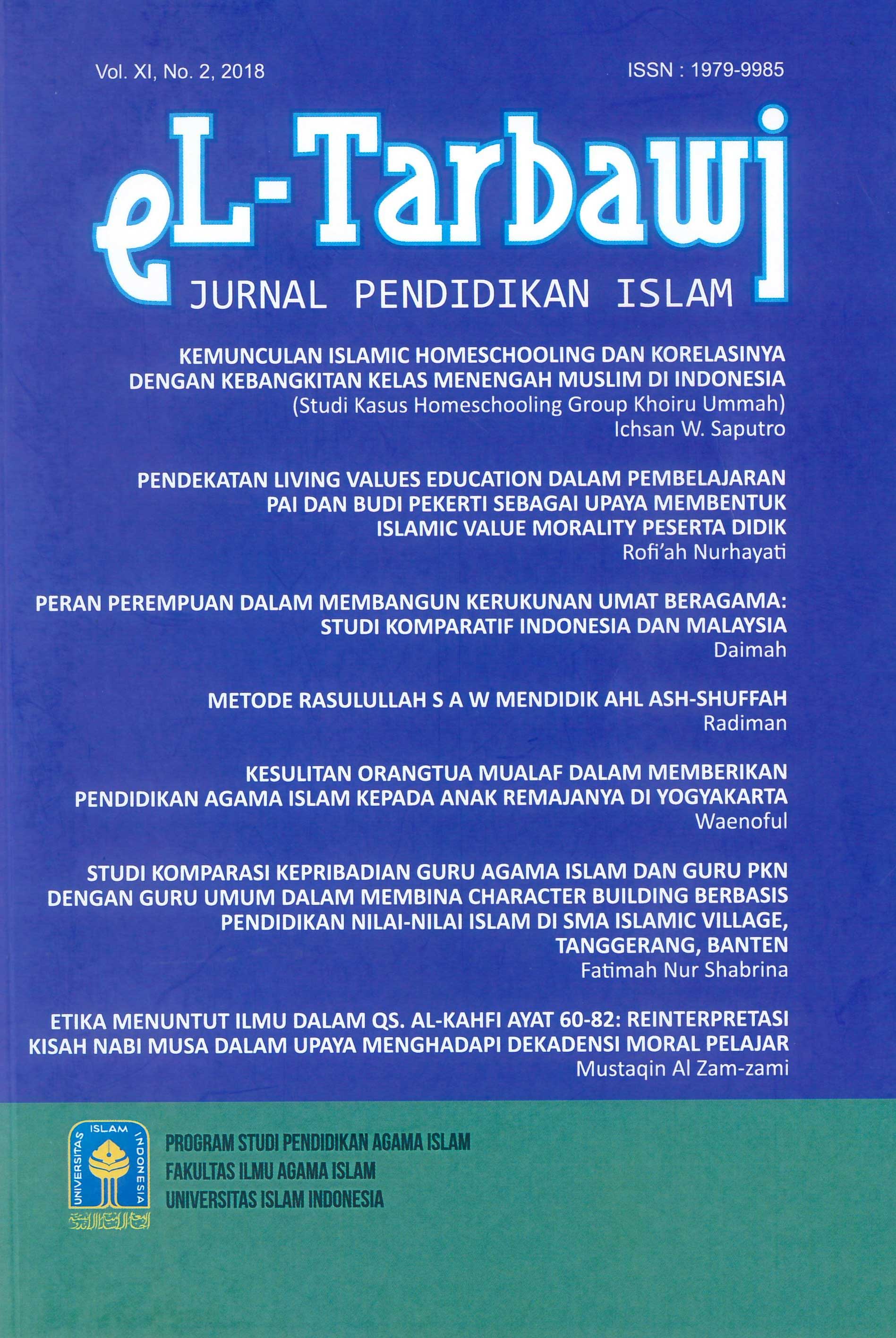Main Article Content
Abstract
Nowadays, we are witnessing many criminal acts related to students and teachers that indicates the failure of education. It is a matter of concern because in the era of rapid technological development, the virtues of morality, character, morals, and dignity are important for the future of the nation. Therefore, in order to scrutiny the cause of the problem above, the researcher conducted a study on the competence of Islamic education teachers and teachers of civics and comparing it with general teachers. The purpose of this study was to determine significant different between the personality of Islamic education teachers and civics education teachers with other teachers on the instilling of character building education-based Islamic values.
The research approach used in this research is quantitative research. The type of research is field research. The location of this research was conducted at SMA Islamic Village, Tangerang, Banten. The subjects of this study are 36 respondents of Islamic education, civics, and general teachers. The data were collected through questionnaire and were analyzed by T-Test (Independent Sample Test) on SPSS version 24.0 for windows.
The results showed us that there is no significant difference between the personality of Islamic education and civics teachers (X1) and the general teachers’ personality (X2). This result is concluded from the result of the T-Test (Independent Sample Test) that the results of 2-tailed (Sig. 2-tailed) significance value of 0.495 and 0.485 is greater than probability 0.05 (p = 0.495 and 0.485> 0.05). The results are also reinforced by the absence of the mean difference of two samples, that is X1 = 6.578 and X2 = 7.025.
Keywords: Teachers’ Personality, Character Building, Islamic Values.
Article Details
Authors retain copyright and grant the journal right of first publication with the work simultaneously licensed under a Creative Commons Attribution (CC-BY-SA) 4.0 License that allows others to share the work with an acknowledgment of the work’s authorship and initial publication in this journal.
References
- Agustian, Ary Ginanjar. 2004. ESQ POWER: Sebuah Inner Journey Melalui Al-Ihsan. Jakarta: Penerbit Arga.
- Amin, Muhammad Rusli. 2013. Rasulullah Sang Pendidik, Menyingkap Rahasia-Rahasia Pendidikan Karkater dari Sirah Nabi Muhammad SAW. Jakarta Selatan: AMP Press.
- Arismantoro. 2008. Tinjauan Berbagai Aspek Character Building, Bagaimana Mendidik Anak Berkarakter?. Yogyakarta: Tiara Wacana.
- Darajat, Zakiah. 2005. Kepibadian Guru. Jakarta: Bulan Bintang.
- Dwiyanto, Djoko, dan Ign. Gatut Saksono. 2012. Pendidikan Karakter Berbasis Pancasila, Negara Pancasila: Agama atau Sekuler; Sosialis atau Kapitalis. Yogyakarta: Ampera Utama.
- Hall, Hellen C. 2003. “Teacher’s Attitude Toward Character Education and Inclusion in Family and Consumer Sciences Education Curriculum”, dalam Journal of Family and Consumers Sciences Education, Vol. 21, No. 1.
- Koesoema, Doni. 2007. Pendidikan Karakter: Strategi Mendidik Anak di Zaman Global, Jakarta: Gresindo.
- Maemonah. Mei 2011. “Pendidikan Karakter dalam Mata Pelajaran Pendidikan Agama Islam di SMP 3 Pekalongan: Kajian atas Kurikulum dan Proses Pembelajaran” dalam Jurnal Penelitian Vol. 8, No. 1.
- Mulyasa. 2007. Standar Kompetensi dan Sertifikasi Guru. Bandung: PT. Remaja Rosdakarya.
- Nata, Abuddin. 2001. Perspektif Islam tentang Pola Hubungan Guru-Murid: Studi Pemikiran Tasawuf Al-Ghazali. Jakarta : PT. Raja Grafindo Persada.
- Peraturan Pemerintah Nomor 19 Tahun 2005, Tentang Standar Nasional Pendidikan.
- Stake, Robert E. 1994. “Case Studies”, dalam Norman K. Denzin & Yvonna S. Lincoln (eds.).
- Handbook of Qualitative Research. London: Sage Publications.
References
Agustian, Ary Ginanjar. 2004. ESQ POWER: Sebuah Inner Journey Melalui Al-Ihsan. Jakarta: Penerbit Arga.
Amin, Muhammad Rusli. 2013. Rasulullah Sang Pendidik, Menyingkap Rahasia-Rahasia Pendidikan Karkater dari Sirah Nabi Muhammad SAW. Jakarta Selatan: AMP Press.
Arismantoro. 2008. Tinjauan Berbagai Aspek Character Building, Bagaimana Mendidik Anak Berkarakter?. Yogyakarta: Tiara Wacana.
Darajat, Zakiah. 2005. Kepibadian Guru. Jakarta: Bulan Bintang.
Dwiyanto, Djoko, dan Ign. Gatut Saksono. 2012. Pendidikan Karakter Berbasis Pancasila, Negara Pancasila: Agama atau Sekuler; Sosialis atau Kapitalis. Yogyakarta: Ampera Utama.
Hall, Hellen C. 2003. “Teacher’s Attitude Toward Character Education and Inclusion in Family and Consumer Sciences Education Curriculum”, dalam Journal of Family and Consumers Sciences Education, Vol. 21, No. 1.
Koesoema, Doni. 2007. Pendidikan Karakter: Strategi Mendidik Anak di Zaman Global, Jakarta: Gresindo.
Maemonah. Mei 2011. “Pendidikan Karakter dalam Mata Pelajaran Pendidikan Agama Islam di SMP 3 Pekalongan: Kajian atas Kurikulum dan Proses Pembelajaran” dalam Jurnal Penelitian Vol. 8, No. 1.
Mulyasa. 2007. Standar Kompetensi dan Sertifikasi Guru. Bandung: PT. Remaja Rosdakarya.
Nata, Abuddin. 2001. Perspektif Islam tentang Pola Hubungan Guru-Murid: Studi Pemikiran Tasawuf Al-Ghazali. Jakarta : PT. Raja Grafindo Persada.
Peraturan Pemerintah Nomor 19 Tahun 2005, Tentang Standar Nasional Pendidikan.
Stake, Robert E. 1994. “Case Studies”, dalam Norman K. Denzin & Yvonna S. Lincoln (eds.).
Handbook of Qualitative Research. London: Sage Publications.
